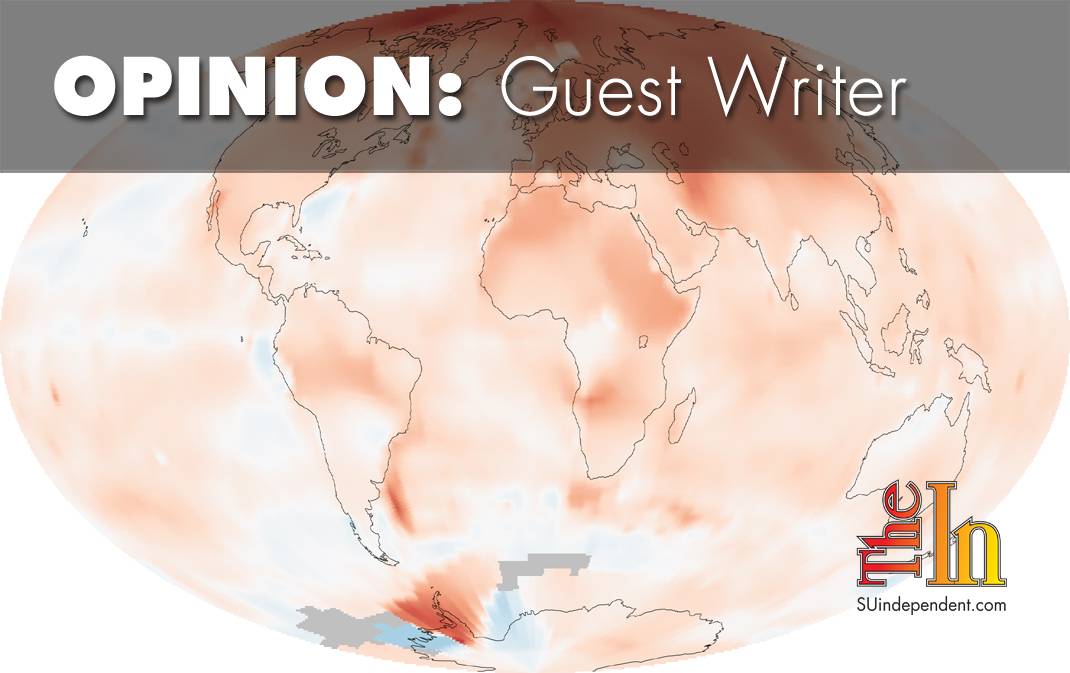Written by Robert L. Bradley, Jr.
In the buildup to the United Nations climate summit in Paris Nov. 30 through Dec. 11, climate alarmists tried to end intellectual debate over the enhanced greenhouse effect. This is the 28th year of the climate crusade to globally cap industrial life.
The secular religion of climate “stabilization” did not arise from nowhere. It emerged in the same period as the discrediting of the Malthusian mainstays of depletion and pollution as well as the discrediting of socialism and central planning. As such, it has been a savior for the government control of economic life, or statism.
 Mass starvation scares of the 1960s peaked with Paul Ehrlich’s “The Population Bomb.” But world agriculture rapidly advanced to refute Ehrlich’s reasoning and prognostications. The alarm turned to resource exhaustion, and none more imminent than oil and natural gas. But the 1980s refuted the 1970s. There was not a shortage of resources but a surplus of government, in retrospect. Deregulation and regulatory reform unleashed abundance. Prices fell for a variety of minerals.
Mass starvation scares of the 1960s peaked with Paul Ehrlich’s “The Population Bomb.” But world agriculture rapidly advanced to refute Ehrlich’s reasoning and prognostications. The alarm turned to resource exhaustion, and none more imminent than oil and natural gas. But the 1980s refuted the 1970s. There was not a shortage of resources but a surplus of government, in retrospect. Deregulation and regulatory reform unleashed abundance. Prices fell for a variety of minerals.
Something else was happening in the 1980s and early 1990s: the fall of the Berlin Wall and the disintegration of the once mighty USSR. Central government planning as a rational economic alternative was intellectually suspect, if not refuted.
That left but one thing for “stabilization”: global warming from the enhanced greenhouse effect, itself resulting from increasing emissions and atmospheric concentrations of carbon dioxide. The embrace was quick.
Enter Al Gore’s “central organizing principle of world civilization” to remake our “dysfunctional” economy, stated in “Earth in the Balance.”
So with COP21, the 21st Conference of the Parties, in full swing in Paris, anything and everything that any government wants to do to “save” the planet is okay. Green is red, and red is green. The plan is to price the nonpriced and impose command-and-control in the name of internalizing external social costs.
Obsessing about climate change is a strategy to avoid talking about turmoil in health care and sustainable economic growth. President Obama and, it seems, the entire Democratic Party want to change the subject from what Americans really care about.
How sad that the Democrats, who once cared about energy affordability and railed against corporate welfare, embrace both in the name of “saving” the climate.
 James Hansen, the father of climate alarmism, rushed out an analysis predicting that the oceans will rise 30 feet by century’s end. ClimateWire reported: “He hoped the study would be accepted before nations head to Paris to hammer out a new global treaty on climate change in December.”
James Hansen, the father of climate alarmism, rushed out an analysis predicting that the oceans will rise 30 feet by century’s end. ClimateWire reported: “He hoped the study would be accepted before nations head to Paris to hammer out a new global treaty on climate change in December.”
So much for free speech and the process of science.
The new dream is a cleansed climate where nature and only nature does its good or bad, free of man’s influence and presence. Deep ecology, in other words, has replaced socialism; green is the new red.
There is a way forward in this very polarized debate. It rests on the latest science. It is the happy middle in the Great Climate Debate, although the alarmists will have nothing of it: global lukewarming from the human influence on climate.
Thanks to physical science, climate economists can easily conclude that modest warming brings benefits, even net benefits over costs.
Global warming activism is a solution looking for a problem. In government hands, the futile crusade is a colossal waste of scarce resources that could otherwise go to address human needs and here-and-now problems.
May COP21 bring disappointment, failure and rethinking — not more government control over human freedom.
Robert L. Bradley Jr. is the founder and CEO of the Institute for Energy Research.





Readers would do well to go to EIR’s website to see where the author’s heart is. The website focuses on fossil fuel energy – at least that’s what is most visible on the home page. Although the author makes some points about other dire warnings not materializing, some of his points need scrutiny. “Mass starvation scares of the 1960s peaked with Paul Ehrlich’s “The Population Bomb.” But world agriculture rapidly advanced to refute Ehrlich’s reasoning and prognostications” may be one. Yes, agricultural advances have provided more food, mostly to first-world countries such as the US to my knowledge. And, look where that mass food production has taken us: obesity, deforestation to provide field area, food additives that challenge human systems, etc. Yes, there are opportunities for some if global warming plays out as most scientists warn. Some areas will enjoy better temperatures, longer growing seasons, while coastal areas may be decimated and some areas fraught with disease because of the warming. Even the military has warned about the consequences and the demands they will place on the military. It seems Mr. Bradley would gladly sacrifice those who will suffer, all in support of free market economics.
This opinion piece is a good example of the straw man fallacy: attack the predictions from Paul Ehrlich’s book and then pretend that you have now refuted the negative predictions regarding climate change.
I also looked at his Institute for Energy Research web site and it looks like a shill for increased access to public lands for more drilling and resource extraction. The IER website tries hard to look scientific and research-based, but the reports and data are so obviously cherry picked that any reasonably educated person will immediately recognize it for the gas-and-oil propaganda machine that it clearly is.
No doubt less regulation and more drilling will lead to significant financial profit to some, but the long term costs are significant and will have to be paid by the rest of us. Mr. Bradley, as the founder and CEO of IER, why would anyone take anything you write on this subject seriously?